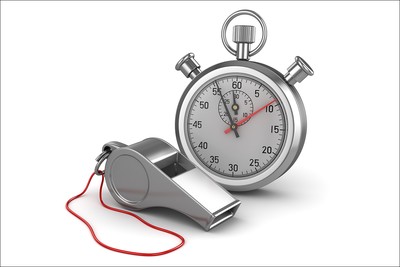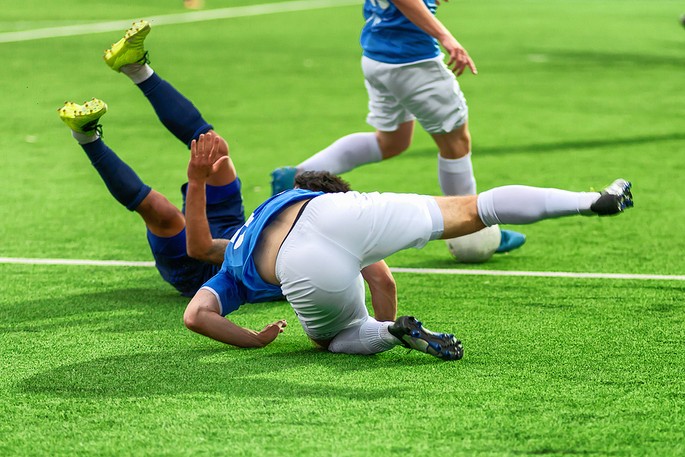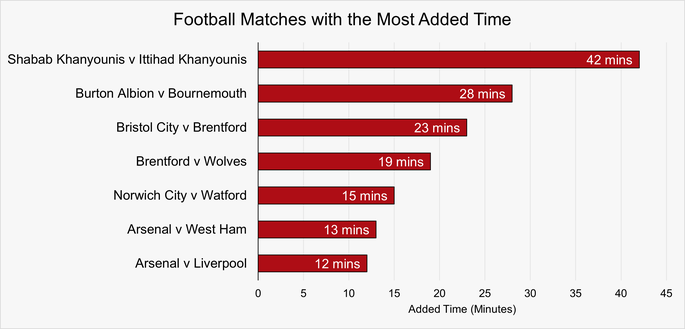 Football matches last 90 minutes. The problem is, that isn’t really true. In theory, that is the length of a game, split into two halves of 45 minutes each. In practice, however, there are any number of things that can disrupt a football match, meaning that the ball tends to be in play for about 30 minutes per half. Theoretically, the referee should stop his watch for the interruptions, with the time being added on at the end of each half in what is often misleadingly referred to as ‘injury time’. In reality, the watch isn’t stopped anywhere near as much as it should be.
Football matches last 90 minutes. The problem is, that isn’t really true. In theory, that is the length of a game, split into two halves of 45 minutes each. In practice, however, there are any number of things that can disrupt a football match, meaning that the ball tends to be in play for about 30 minutes per half. Theoretically, the referee should stop his watch for the interruptions, with the time being added on at the end of each half in what is often misleadingly referred to as ‘injury time’. In reality, the watch isn’t stopped anywhere near as much as it should be.
As a result, the length of stoppage time played in each game will vary depending on what has happened and the whim of the referee. Unsurprisingly, some matches end up having much longer injury time than others, with very little consistency across the Premier League, let alone football as a whole. For supporters, it is difficult to escape the feeling that they’re being short-changed, which is why FIFA reportedly toyed with the idea of stopping the clock when the ball goes out of play, much as they do in rugby. The question is, what is the longest injury time that football has seen?
Quick Answer: Which Football Match Has had the Longest Amount of Injury Time Added?
The record for the longest amount of injury time played in a football match is the 42 minutes added to the Shabab Khanyounis v Ittihad Khanyounis game in the Gaza Premier League on the 2nd September 2019. Despite this, the fixture finished goalless.
The longest amount of injury time played in an English match was 28 minutes when Burton Albion played Bournemouth in the League Cup on the 25th September 2019.
What Do Referees Add Time For?

Before we get into the details of the longest injury times in football, it is worth noting what it is that the referees should add time on for at the end of each half. It is easy enough to get caught up in the idea of the sorts of things that referees might add time for, with the constant referral to the period of time in question as ‘injury time’ often muddying the waters, but according to the Football Association, the following things will be borne in mind by referees when it comes to ‘time lost’:
- Substitutions
- Assessment of injured players & their removal from the pitch
- Time-wasting
- Disciplinary sanctions from the referee to players
- Medical stoppages such as drinks breaks or ‘cooling’ breaks when needed
- Checks and reviews carried out by the Video Assistant Referee
- Any other causes that result in a significant delay to play restarting, such as goal celebrations
Bearing all of that in mind, it will be a surprise to most people just how short the stoppage time is in most football matches. It is not uncommon, for example, for the fourth official to indicate that there will be, say, three minutes of stoppage time, only for a player to go down injured or a VAR review to be carried out, yet the referee ends the match after three minutes have elapsed. Little wonder, therefore, that many football fans often feel short-changed by the amount of stoppage time that is added at the end of each half.
When Stoppage Time Exceeds The Norm
During the 2022 World Cup in Qatar, referees seem to have been told to be more strict in the time that they added on to the ends of halves of football. Despite the norm being three or four minutes, referees started adding on eight, nine or ten minutes after players had been found to be wasting time. That feeling of a few minutes being what is typical for referees to add on really does highlight just how crazy it is that some of the matches that have taken place over the years have seen extremely long periods of time added to the end of at least one of the halves.

12 minutes – Arsenal vs Liverpool (2011)
When Liverpool travelled to the home of Arsenal during the 2010-2011 season, they did so knowing that they were nowhere near challenging for the title. The same could not be said about the Gunners, however, who were hoping that a victory would put them a touch closer to Manchester United at the top of the table. Heading into the game, the Merseyside club were under strength thanks to injuries, whilst the home side had faced criticism for being pretty but without any penetration. That proved to be something of a problem for them as the game went on.
The first-half played out pretty much as expected, with Arsenal dominating possession but not really testing the Liverpool goalkeeper Pepe Reina. There were just two minutes of added time at the end of the first period, so not much to report there. In the second-half, the game followed a similar pattern until Jamie Carragher suffered a head injury after a clash with his teammate Jon Flanagan. This, amongst other things, resulted in a lengthy added period of 12 minutes and 26 seconds. Arsenal thought that they’d won it thanks to a Robin van Persia penalty after 98 minutes, only for Dirk Kuyt to score a penalty for away side after 102 minutes.
13 minutes – Arsenal vs West Ham United (2013)
Whilst Arsenal’s rivalry with West Ham United isn’t even close to being their most fiery, given the fact that the North London Derby exists, it is still a match that has a certain degree of pride riding on it for those that live in the nation’s capital. There was even less riding on it than usual when you consider that Arsenal would finish the game in sixth place and West Ham were in 12th, so it isn’t even as if there was a title on the line. Even so, there was a shock at the Emirates when Jack Collison gave the Hammers the lead after just 18 minutes, suggesting a possible shock.
The Gunners equalised after just four minutes, with many thinking a tight second-half was in store. Instead, the home side were rampant, with a brace from Olivier Giroud sitting amongst goals from Santi Cazorla and Theo Walcott to see them run out 5-1 winners. Things weren’t made much better for the visiting side when an injury to Dan Potts resulted in them going down to ten men, on account of the fact that they’d used all their substitutes. The referee added the time on at the end, with 12 minutes and 58 seconds being the added time, but Arsenal couldn’t add to their lead.
15 minutes – Norwich City vs Watford (2022)
When Watford arrived at their home ground of Vicarage Road on the 21st of January 2022, they did so knowing that it was a true six-pointer in the relegation battle. They needed to try to get something out of the game against Norwich City if they were to have any hope of survival, whilst the Canaries knew that their time in the Premier League might be limited if they couldn’t get all three points. That perhaps led to some tension for both teams, with no goals having been scored when the referee blew for half-time. An action-packed second-half began with a goal for the away side after just six minutes.
On the hour mark, one of the floodlights flickered and then went out, the response of the home fans to which was to get out lighters and turn the torches on on their phones. Despite the protestations of Jamie Carragher and Gary Neville on commentary duty, the match didn’t resume until after a stoppage of 11 minutes and 32 seconds, which was when the two managers agreed to play on with what light there still was. Norwich scored almost immediately before Dennis was sent off for Watford and an own goal by Kucka resulted in the Canaries winning 3-0 after 15 minutes of stoppage time. In the end, both teams were relegated anyway.
19 minutes – Brentford vs Wolverhampton Wanderers (2022)
As listed earlier, there are all sorts of reasons why a football match might result in time added on by the referee, but perhaps none are quite as ‘modern’ a problem as what caused a disruption between Brentford and Wolverhampton Wanderers in 2022. The match had gotten underway without anything interesting to report, but about half an hour into the first-half a drone began to hover above the pitch. Peter Bankes, the referee for the occasion, was forced to draw proceedings to a halt and take all of the players off the pitch for safety reasons, in accordance with Premier League rules.
The drone-based interruption followed on from a stoppage earlier when Mathias Jensen and Rico Henry clashed heads, resulting in them both being taken off. When the drone flew away before its operator could be discovered, the players emerged back onto the pitch and the game continued. When the board went up to display the added time, no one was overly shocked to see that the referee had chosen to add 19 minutes on to the game. What makes it even more interesting is the fact that it the match was held during the same game week as the Game between Norwich & Watford.
23 minutes – Bristol City vs Brentford (2000)
The League Cup isn’t really known for particularly exciting encounters, if we’re all being honest about it. It is far to say that the clash between Bristol City and Brentford during the 2000 – 2001 season had plenty worth discussing, however. In the first-half alone there was a broken leg, a dislocated shoulder and a concussion, which resulted in the referee having to add on a severe amount of time. What complicated matters further was the fact that one of the injuries took place during the stoppage time at the end of the first-half, meaning that the referee needed to add on even longer.
Having originally indicated that he planned to play another 13 minutes, there ended up being 23 minutes of stoppage time before the half-time whistle could be blown. If you wanted to be strict about it then you could also add on the time added at the end of the second period, but we haven’t done that anywhere else so we’re happy enough leaving it off the total time. To add insult to injury to the players and supporters, this was back in the day when the League Cup was played over two legs in all rounds, meaning that the 2-2 draw was merely the first serving of a tie that must have felt like it would go on forever.
28 minutes – Burton Albion vs Bournemouth (2019)
When Bournemouth went to Burton Albion’s home ground in the League Cup in 2019, they did so knowing that the League One side had been the surprise package of the competition the previous season, making it to the semi-finals. Even so, the Premier League team were thinking further down the line and possible top-flight survival, hence a decision to make ten changes to their starting line-up. A limp display from the Cherries resulted in Burton taking the league after 14 minutes, taking that lead into half-time after the referee added four minutes for numerous stoppages.
If Bournemouth were hoping to get a little bit of momentum in the second 45 then they were to be scuppered not by Burton Albion’s play so much as by the floodlights. Yes, Nathan Broadhead doubled the home side’s lead after nearly half an hour of second-half play, but it was the fact that the floodlights went out on three separate occasions that causes the most problems. It resulted in the referee actually calling the game off, only to be informed by the Football League that matches can only be abandoned after 30 minutes of stoppages. That he ended up adding 28 minutes on at the end tells you how close they came.
42 minutes – Shabab Khanyounis vs Ittihad Khanyounis (2019)
It isn’t just in England where matches can see large amounts of stoppage time added by the officials. It is with this in mind that we turn our eyes to the Gaza Premier League and a match between Shabab Khanyounis and Ittihad Khanyounis 2019 in order to find the longest recorded period of added time in football history; at the time of writing at least. It is fair to say that the match between the two rivals won’t have caught that many people’s attentions, but the match was plagued with stoppages thanks to issues with the floodlights, just as with Burton Albion and Bournemouth.
The match got underway but the floodlights were not activated, with the main difficulty being that no one could find the technician in charge of them. It took virtually the entire half for him to be located, meaning that the referee was forced to play 42 minutes of added time after the three minutes of normal play. Whilst that certainly makes for an interesting pub quiz question, it wasn’t enough time for either side to score a goal. The match was entirely uneventful apart from the floodlight issue, finishing 0-0 and with neither of the two rival sides even being able to take home the points alongside their fun story.
